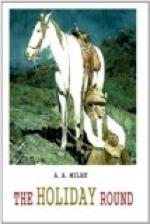. . . . . . . .
Of course the King’s son (or anyhow, Mr Hogbin) ought to have sent it round to all the ladies in Mayfair, taking knightly oath to marry her whom it fitted. But what actually happened was that a footman found it, and, being very sentimental and knowing that nobody would ever dare to claim it, carried it about with him ever afterwards—thereby gaining a great reputation with his cronies as a nut.
Oh, and by the way—I ought to put in a good word for the godmother. She did her best.
“Cinderella!” said her mother at lunch next day, as she looked up from her letters. “Why didn’t you tell me your godmother was ill?”
“She wasn’t very well when I left her, but I didn’t think it was anything much. Is she bad? I am sorry.”
“She writes that she has obtained measles. I suppose that means you’re infectious. Really, it’s very inconvenient. Well, I’m glad we didn’t know yesterday or you couldn’t have gone to the dance.”
“Dear fairy godmother!” said Cinderella to herself. “She was a day too late, but how sweet of her to think of it at all!”
A LITERARY LIGHT
Annesley Bupp was born one of the Bupps of Hampshire—the Fighting Bupps, as they were called. A sudden death in the family left him destitute at the early age of thirty, and he decided to take seriously to journalism for a living. That was twelve years ago. He is now a member of the Authors’ Club; a popular after-dinner speaker in reply to the toast of Literature; and one of the best-paid writers in Fleet Street. Who’s Who tells the world that he has a flat at Knightsbridge and a cottage on the river. If you ask him to what he owes his success he will assure you, with the conscious modesty of all great men, that he has been lucky; pressed further, that Hard Work and Method have been his watchwords. But to the young aspirant he adds that of course if you have it in you it is bound to come out.
I
When Annesley started journalism he realized at once that it was necessary for him to specialize in some subject. Of such subjects two occurred to him—“George Herbert” and “Trams.” For a time he hesitated, and it was only the sudden publication of a brief but authoritative life of the poet which led him finally to the study of one of the least explored of our transit systems. Meanwhile he had to support himself. For this purpose he bought a roll-top desk, a typewriter, and an almanac; he placed the almanac on top of the desk, seated himself at the typewriter, and began.
It was the month of February; the almanac told him that it wanted a week to Shrove Tuesday. In four days he had written as many articles, entitled respectively Shrovetide Customs, The Pancake, Lenten Observances, and Tuesdays Known to Fame. The Pancake, giving as it did the context of every reference in literature to pancakes, was the most scholarly of the four; the Tuesday article, which hazarded the opinion that Rome may at least have been begun on a Tuesday, the most daring. But all of them were published.




